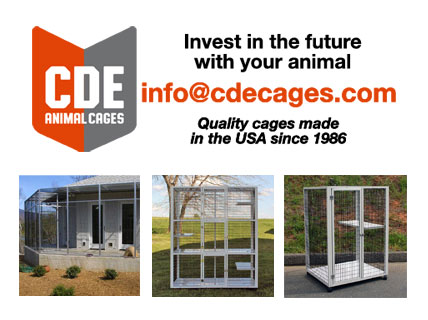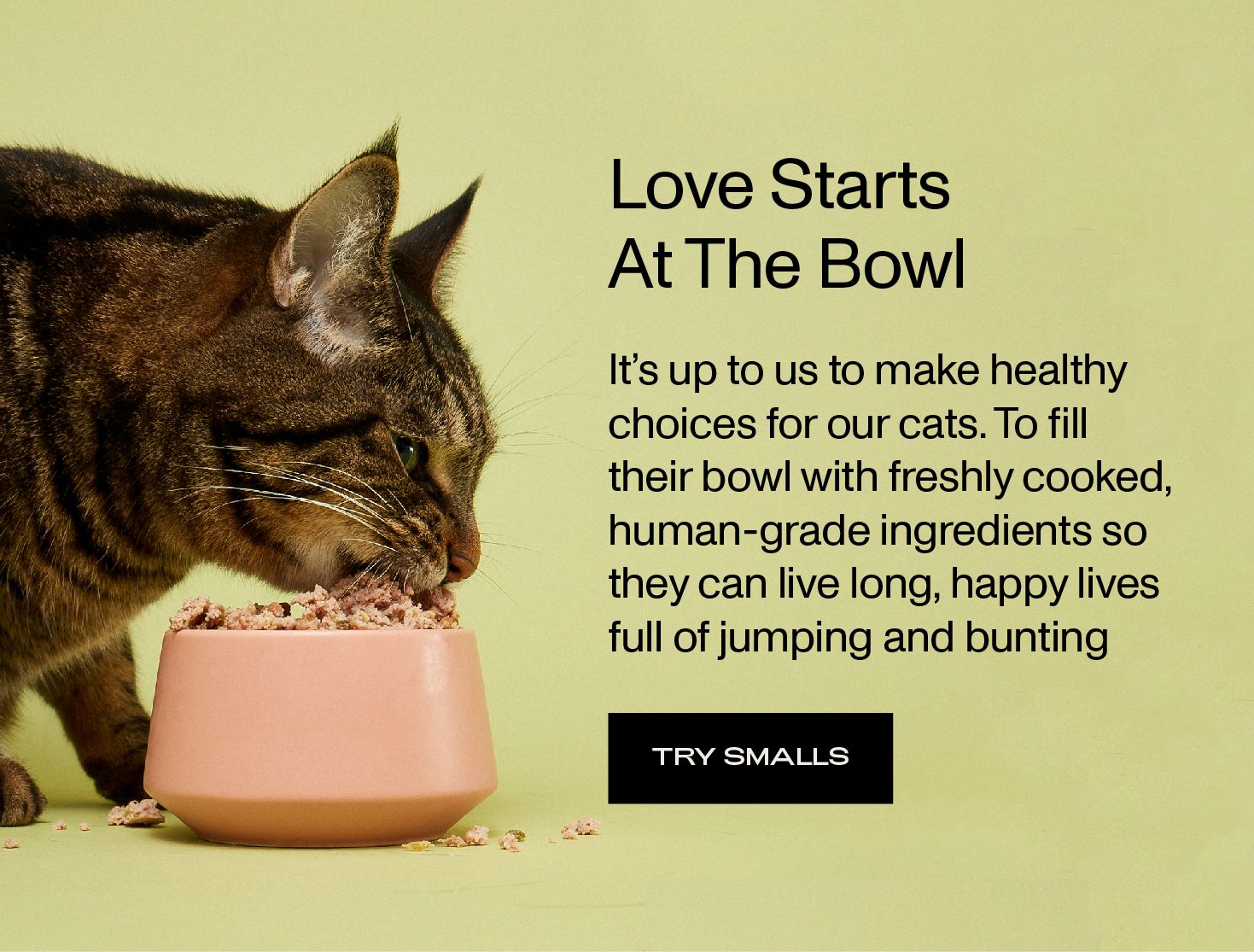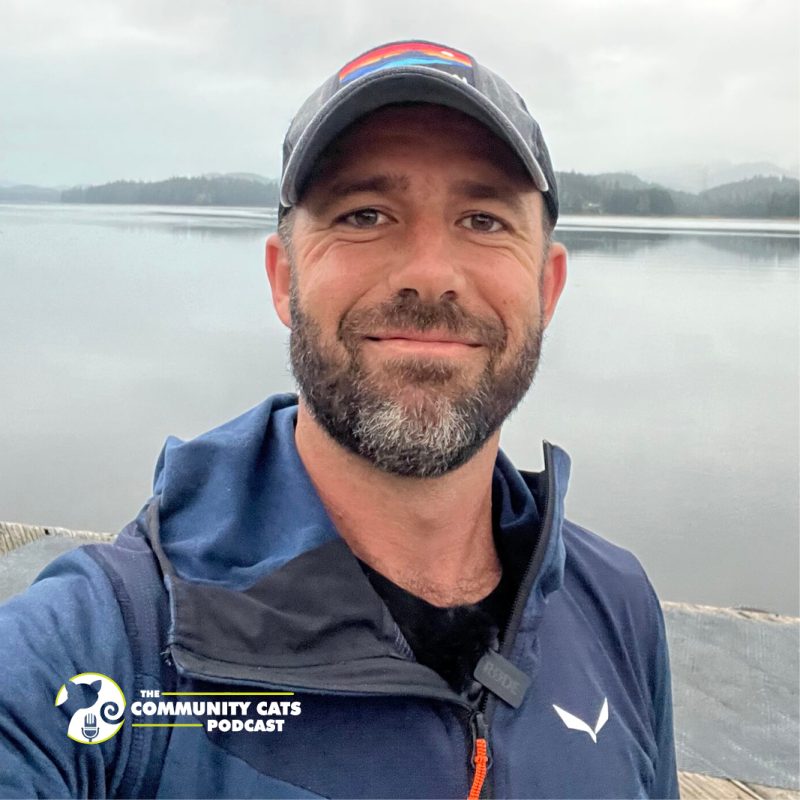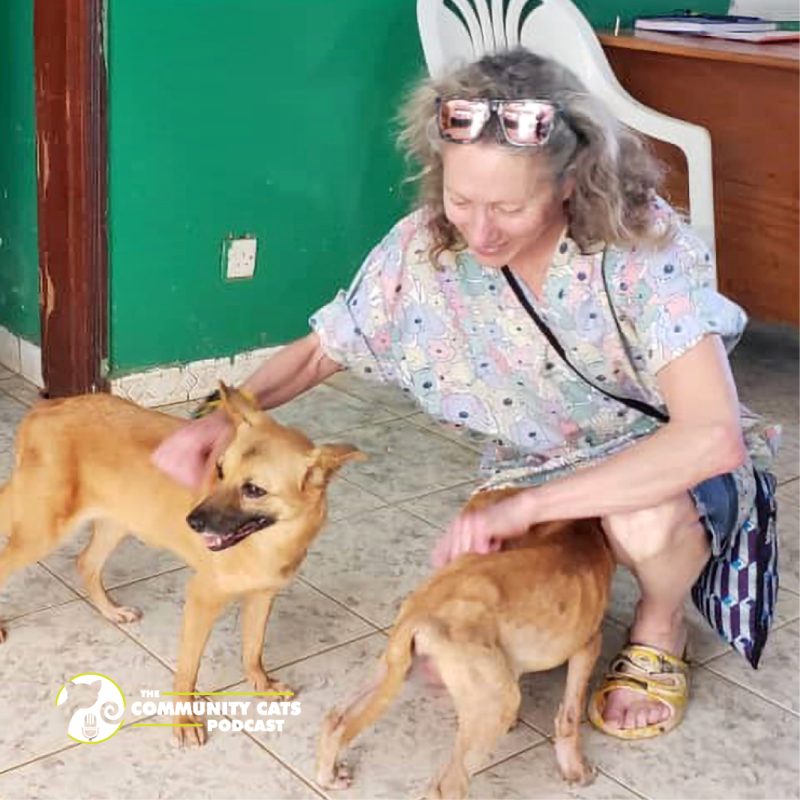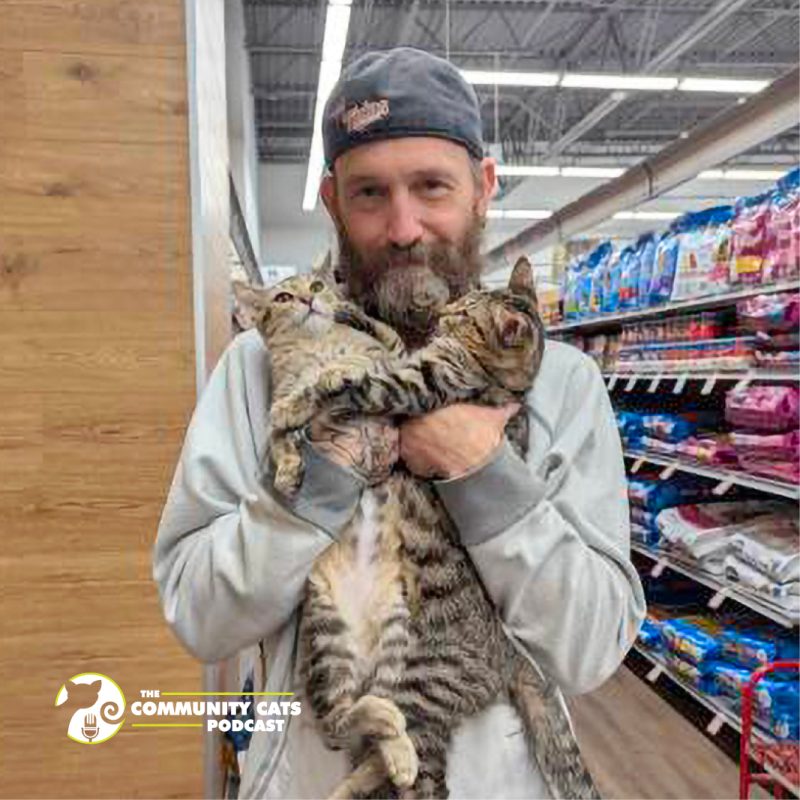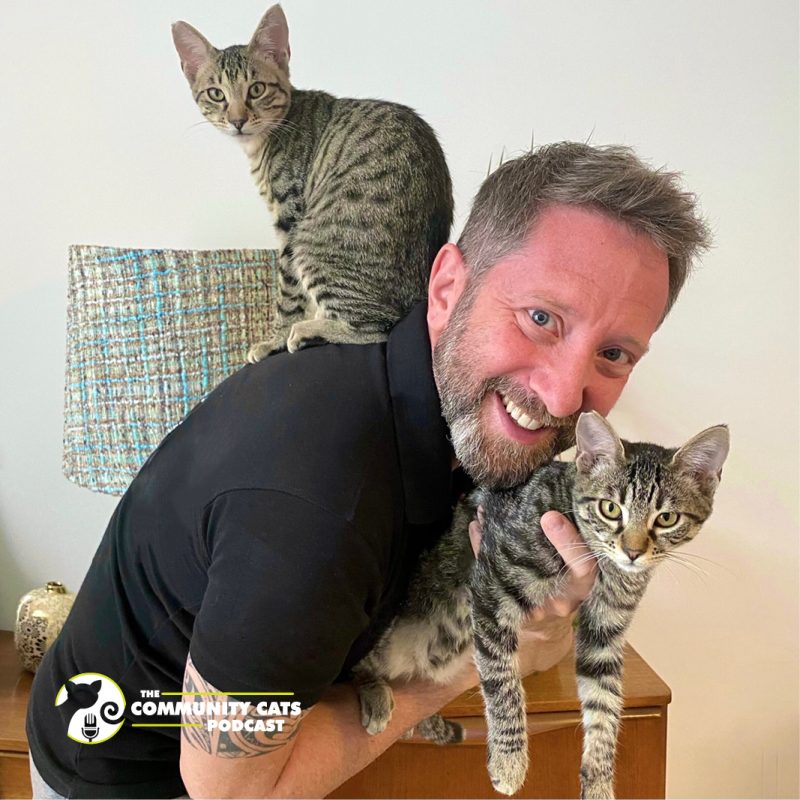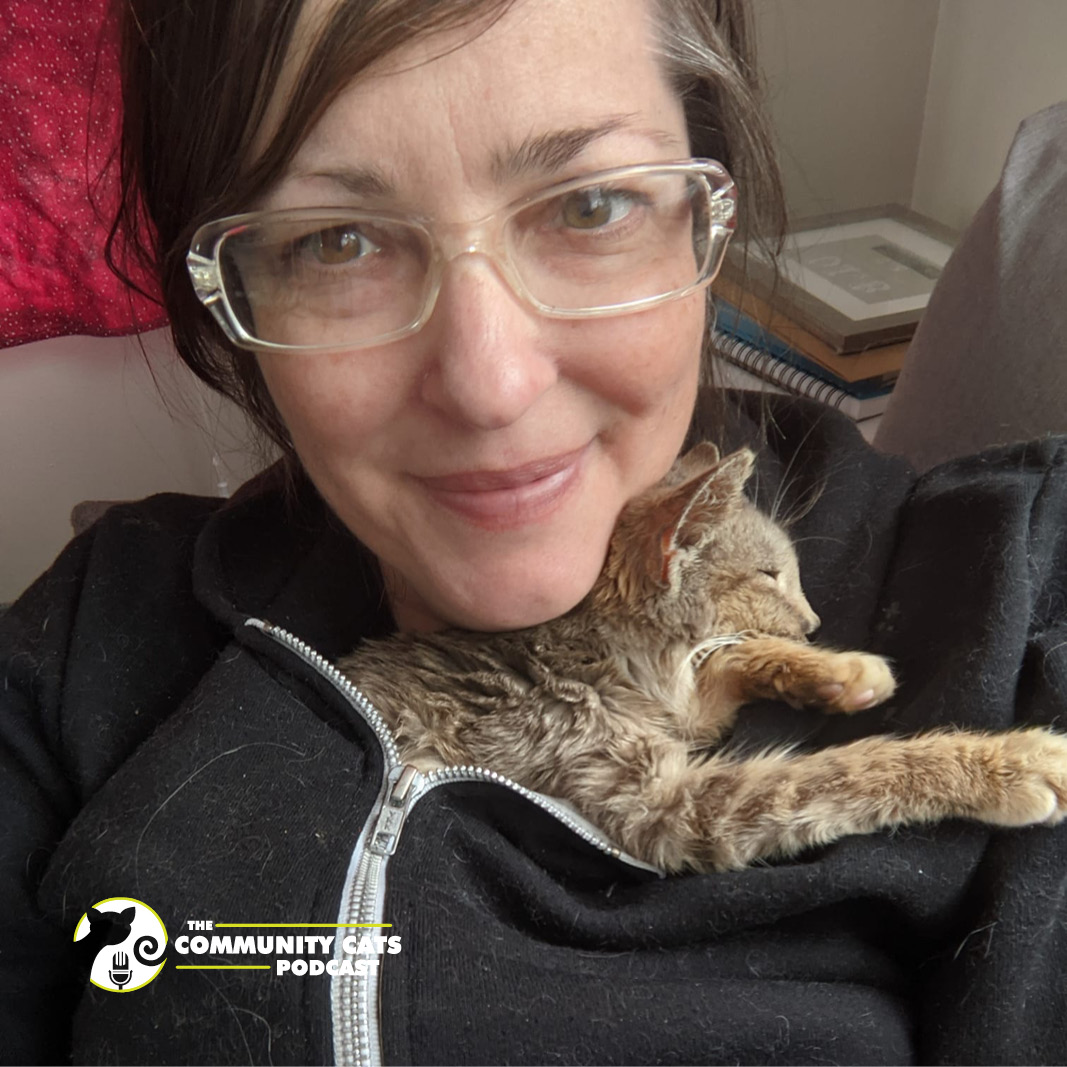
Andee Bingham, Esther Neonatal Kitten Alliance
June 22, 2021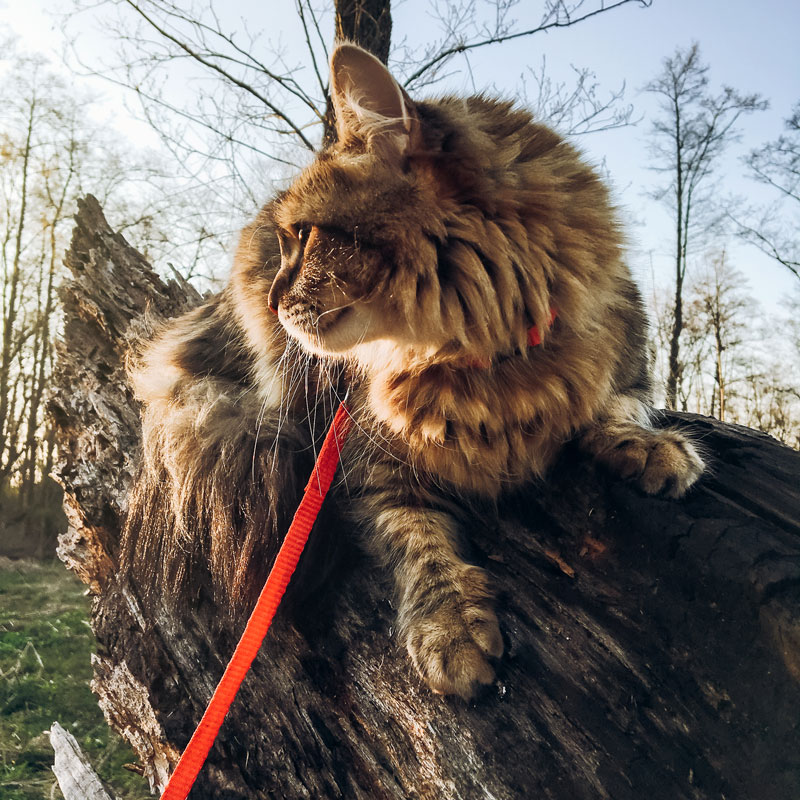
Adventure Cats
July 1, 2021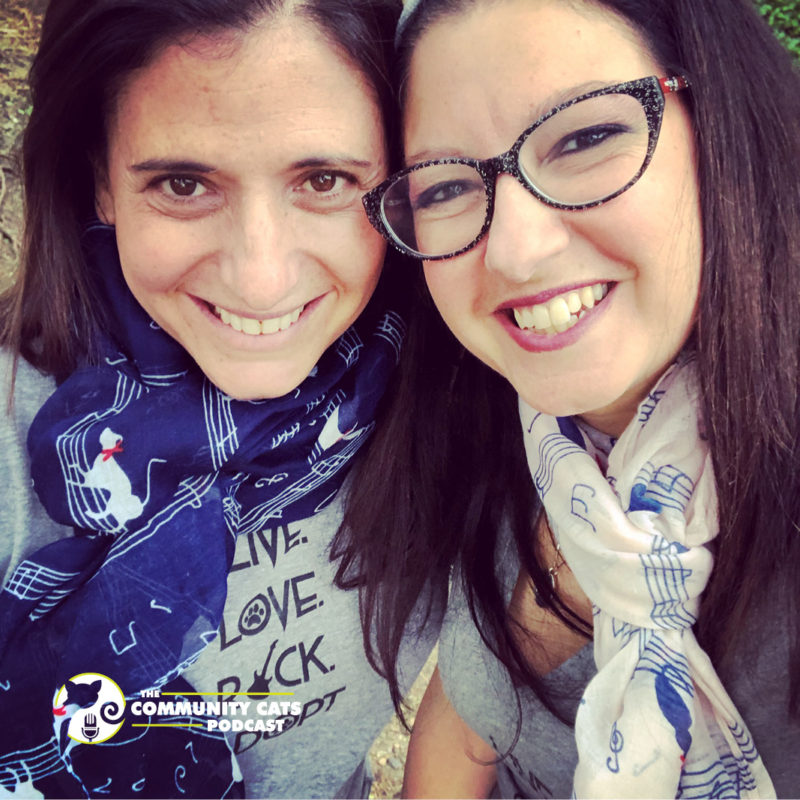
“We save animals to save people”
Listen to Episode #410 Now
This episode is sponsored in part by Smalls Fresh Cat Food and Doobert.com.
Juli Cialone and Marla Valentine of Rock N’ Rescue chat with Stacy this week about their unique approach to cat rescue. Juli is the co-founder and executive director of Rock N’ Rescue with a background in professional photography. Marla is a social worker in long term care with over 25 years of experience.
Rock N’ Rescue, located in South Salem, NY, partners with shelters to match cats’ temperaments to their adopters with a focus on placing animals into homes where there is a therapeutic need. They have a strong support system for adopters, resulting in low rates of return. They also do a lot of community outreach with Girl Scouts, high schools and middle schools, as well as bringing kittens to local nursing homes and assisting with occupational therapy.
To find out more about Rock N’ Rescue, visit their website. They can also be found on Facebook and Instagram.
Read Episode #410 Now
CommunityCatsPodcast_Ep410_Cialone_210629.mp3
https://www.communitycatspodcast.com/episode-410-juli-cialone-and-marla-valentine/
Episode Highlights:
@ 00:01:52 – Marla talks about Rock N’ Rescue’s therapy program
@ 00:04:46 – Julie talks about their adoption program
@ 00:07:54 – The importance of providing support and resources to adopters
@ 00:16:30 – Getting positive feedback on the impact cats have in adopters’ lives
@ 00:18:01 – About their foster based philosophy
@ 00:20:05 – If you want to learn more
Full Transcript:
Kristen Petrie [00:00:02]
You've tuned in to the Community Cats Podcast. Ready? Let's go.
Stacy LeBaron [00:00:13]
Welcome to the Community Cats Podcast. I am your host, Stacy LeBaron. I've been involved in helping homeless cats for over 20 years with the Merrimack River Feline Rescue Society. The goal of this podcast is to expose you to amazing people who are improving the lives of cats. I hope these interviews will help you learn how you can turn your passion for cats into action. Today, we’re speaking with Juli Cialone and Marla Valentine. They are both with Rock N’ Rescue. Welcome to the show, ladies.
Juli Cialone [00:00:41]
Hi.
Marla Valentine [00:00:42]
Hi.
Juli [00:00:43]
Great to be here.
Stacy [00:00:43]
So, Juli you want to just share a little bit about what you do for Rock N’ Rescue and a little bit about your background.
Juli [00:00:51]
Sure. So, I'm the co-founder and executive director, and we founded the rescue in 2003 in Rochester, New York. And then the rescue itself changed, just in a manner of speaking, changed its mission. And now in the current rescue in South Salem, New York, my focus is adoption of cats primarily as therapy animals. Historically, my background is I've worked as a professional photographer for 25 plus years. It was founded basically on the knowledge that I can go out there and volunteer my time and donate my time to charities, which primarily were animal charities, who always called everyday. And that's how I became known for my photography and started my whole career. And then that blossomed into working at shelters, seeing how rescues were run, and then learning how to create one myself that's going to be a little more focused on what I do in general.
Stacy [00:01:51]
Marla, what about you?
Marla [00:01:52]
So, I have been a social worker in long-term care for over 25 years. My last employment was in a nursing home. I was the director of Social Services, and it was rewarding and fulfilling, but I met Juli in 2017 and started fostering for her. So, that's when Juli and I met, our friendship blossomed, and I decided to take on more role in the rescue, and I learned from Juli. We started working together, full-time in 2019 and the rescue blossomed. We put an emphasis on our mission, which is that we save animals to save people, and we started working with the community in a therapeutic way. So, we started bringing in kittens to local nursing homes and had kitten clubs. So, we would work with occupational therapists doing fine motor skill work with what we would call fishing rods. We would place the kittens in playpens and have wheelchairs and regular chairs around the playpen, and everyone would have a little fishing pole and they would work on catching the kitten. And once they did, we would take that kitten, we would swaddle it up and hand it to them. So, during that time, Juli and I would also be walking around the room and sharing stories with the residents, and doing some reminiscence therapy. So, the therapeutic part of what we do really grew from there. We started with one nursing home, and over a course of a year, we grew to seven. We also do a lot of community outreach. We work with local Girl Scouts, and we work with Brownie troops. In our community, we work with the John Jay High School Middle School. They have an animal care club. So, it's a lot of education, it's a lot of working with individuals and trying to place animals into homes where there's a therapeutic need. It's temperament matching. So that's really what we love to do.
Stacy [00:04:19]
That's great. So, I’m gonna ask you a few more questions about your pet therapy program. So, in addition to the work that you've done at the nursing homes and within the schools, and it sounds like you find adoptive homes that's with families that match the pet with the family in a unique way. Is there anything different in your process, maybe versus a standard adoption process that you use when you're doing this program?
Juli [00:04:46]
On my side of the rescue, I'm the adoptive sidewall. Marla is like the post-adoption or during adoption side. So, we have we have a two-part process. The first part is finding the animals through our partner rescues. We work with many from the south, Bowling Green, Kentucky is one of our huge shelters that we work with, and we have a series of groups of rescues in southern Alabama that we work with. And we tell them, they know what we want. We have a list that we give to them all. They have to have this checklist, and with each animal, does it pass certain temperament testing? Good with dogs, good with cats, good with children? Can this cat handle this situation or that? We give them very specific characteristics and they start telling us, okay, we have this cat and this cat and this cat. And they start describing all the things that we need to match with personalities. For finding a family let's say who has an autistic child, it might need a different kind of cat than a family who has someone suffering from depression and suicide. So the idea of a cat as a therapy animal in general is just different than the same testing you would do for a dog, but some other things obviously are similar. Once we have that match, and I interview the adoption family or individual, we start showing them different options and then we slowly come together, bringing the matches together and finally find that match. Once the match is made, then Marla puts together the actual adoption. This year because of COVID, it's been really tricky, but we have mastered the curbside adoption. It's become quite a thing and people are actually enjoying it. Someone's car is nice and quiet. It's a personal space. It smells like the family. So it actually is a nice quiet spot for someone to meet their pet for the first time. And I think out of all of our adoptions last year, we did over 2,200, they all, on the first choice, that was the cat that they fell in love with. It was the perfect match each time. But once the adoption is done, Marla takes over, and make sure the adjustment process is good that we are following up with any kind of medical concerns they might have, or feeding concerns, or just hate me, a behavioral integrating into the home, and then we become a 24/7 hotline for them. So both of our personal numbers go out to them. We call them like, you know, use it, the Rock N’ Rescue hotline don't erase that group text message. Send us your happy pictures, but also send us, you know, if you have a conflict at your house, if you have if you're getting deciding to you know, someone is having a baby or you're going to be moving or you just want to say, like ask about a new product that's coming out. We're always there as a hotline for the adopter. And that whole process gives us a huge, like a low rate of return of any animal because we are there step by step and if there is a problem along the way we can fix it before that animal has you know, is totally, you know, not a right match. Most people, especially newer adopters who have never had a cat before people who are under stress or some kind of medical illness. Sometimes they can be nervous having a new pet. You know, that new pet jitters. But we make them feel that is never their jitters to worry about, it is always on us to make sure that the adoption runs smoothly and so far that's been the case.
Marla [00:07:54]
It's the support and resources that we provide, which makes us, I feel, extraordinary. The 24/7, we get calls and we get texts constantly.
Juli [00:08:04]
Yeah, non-stop.
Marla [00:08:06]
My cat is, is on my counter and I don't know if it belongs on my counter or my cat is trying to climb the curtains or, you know, my house cat which once loved me, is now hissing at me since I brought in the kitten. These are the type of questions that we answer, and that this is what we feel.
Juli [00:08:22]
Sometimes, I know it sounds crazy but little things like sometimes a cat will have an accident and they'll be like, you know, they'll super freak out and they won't think about the fact that it had the accident because the litter box was next to the dryer and they happen to be washing somebody's pair of sneakers and it was making a horrible noise and the cat got scared. So, we go over, like, we go over step-by-step, where it had the accident, what happened, and then we fix the problem before six months later, the cat’s having accidents all around the house because they don't understand that they made a mistake in the beginning. So it's stuff like that that it seems small but it could, it could spiral out of control and get an animal, you know, back into a bad situation.
Stacy [00:08:59]
So, you know, you adopted out quite a significant number of cats in the last year. Are all of those sort of within this pet therapy program or do you do I guess what I would say the more standard adoptions also.
Marla [00:09:12]
We do a lot of standard adoption. So they're not all—we interview our families and individuals who are requesting a therapeutic placement. And we then do, you know, we do that the custom matching, but you'll find on Petfinder we’ll put on a lot of animals as well. And the kittens, it’s really hard for us to do a therapeutic placement with a kitten. We really don't know their temperaments and personalities, because it's still evolving and changing. So those adoptions are really what support us right now and allow us to do what we love to do, which is the therapeutic placement. So, we'll have like a minimum donation for the adoption of the kittens. And with that money, you know, it goes to help fund all of our programs, which it's the therapeutic programs, it’s the placement programs. We’re working on a Wellness Center. We work with psychologists and social workers in the community, trying to, you know, place animals into their practice. The funds from the standard adoptions really help to move us toward that because of our standard adoptions. We are also able to do a lot of pulling of animals, which are special needs. So we do an enormous number of animals that are blind, animals that are deaf, animals that need amputations, animals that have you know, have had cancer and lymphoma and, well not lymphoma, but different areas of specialized cancer where we will do what—we've done removal of body parts to get rid of the of the cancer. We had a cat that had cancer on the, on the ear, so we were able to remove the ears. We've had enucleations. We've had several animals that needed to have their eyes removed. These, we find are very, very special cats. So if they temperament test and if they can go into a therapeutic home, so if they're good with kids, good with loud noises. If they are technically bomb proof, I don't care if they're two or if they're 12, we are going to rescue them. I don't care if half their face is removed. We are going to rescue them and we are going to be able to place them. Right now we have a wedge head Siamese, who was starved. He's 12 years old. He is under 5 pounds and we just pulled him. We had a feeding tube put in, he has severe pancreatitis, but his prognosis is fair to good and this is a therapy cat. This is an animal that has with stand so many traumas in its life and still can stand up on all four legs and give a headbutt and walk over to a stranger and lie down on their lap. This is what we look for. So when we see that and there's a will to live. That's our cat.
*Break for advertisements*
Stacy [00:12:00]
Give your feline friend, protein-packed meals they'll crave with Smalls. Smalls is fresh, human-grade food for cats delivered right to your doorstep. So you too can embrace your inner house cat. All cats are obligate carnivores. They need fresh protein-packed meals. Conventional cat food is made with profits in mind, using low quality, cheap meat byproducts, grains and starches coated in artificial flavors. Smalls, on the other paw, is made with cats in mind. Smalls develops complete and balanced recipes for all life stages with leading cat nutritionists. Starting with human-grade ingredients like you or I would find at the market, Smalls’ recipes are gently cooked to lock in protein, vitamins, minerals, and moisture. No room for fillers. No need for flavoring. Better quality ingredients mean a better, healthier life for your cat. Since switching to Smalls, cats have experienced improved digestion and a less smelly litter box, softer and shinier coats, plus better breath. Try Smalls today for your cats in your household. Hooch, loved it.
Kristen [00:12:56]
Use offer code Community cats at checkout, for a total of thirty percent off your first order at Smalls.com.
Stacy [00:13:01]
Are you ready to be part of the solution for feral and stray cats in your neighborhood? If so, then make sure to sign up for our next Neighborhood Cats TNR Certification Workshop. A new workshop is held online each month, generally on the first Saturday of the month, but please check our website for exact dates. For just ten dollars, expert instructors will teach you best practices for trap, neuter, and return. TNR. Learn what TNR is and why it works. We’ll cover getting along with neighbors, preparations for trapping, trapping itself, including entire colonies at once, feeding, providing winter shelter, and more. Take advantage of the interactive format, extensive handouts, and video footage of actual projects. Attendees will receive a certificate of attendance and gain access to an ongoing Facebook group for networking with other TNR activists. The two-and-a-half-hour workshop is led by Susan Richmond, the executive director of Neighborhood Cats, and Bryan Kortis, Neighborhood Cats National Programs Director. To find out the date of the next workshop and sign up, just visit CommunityCatsPodcast.com.
Stacy LeBaron [00:14:00]
As we emerge from the global pandemic of Covid, fostering is emerging as The New Normal in the animal welfare industry, but shelter management software doesn't provide the tools or the workflows for communicating with fosters at scale. So many organizations struggle to maintain hundreds of animals in foster homes. If only there was a system that was custom built specifically to solve this problem. Introducing Foster Space, powered by our friends at Doobert. Foster Space was custom-built to allow you to manage hundreds of foster relationships and to communicate with them via text, email, and even Facebook messenger. Your fosters have a portal where they can upload videos and photos and updates on their animals. And organizations can schedule fosters for meet-and-greets, adoption days, or anything else they need. There's so much more to check out. Sign up for free at www.doobert.com and go to the Foster Space tab to get started.
*Back to the show*
Juli [00:14:48]
Today actually, one of our cats is in surgery for a broken leg because it fell out of skyscraper. Also, a mammary tumor. This week we have a blind cat coming in that had a double enucleation. We have Wobbly. She's missing one eye and had one of the eyes removed but she happens to be one of the sweetest cats I think I've ever seen.
Marla [00:15:08]
Multiple cats with CH.
Juli [00:15:10]
Yeah, we’ve had CH cats.
Marla [00:15:08]
This week we had a cat which had a rectal prolapse, which require her strings and we don't know what the history is going to be. Will it need more surgery down the line? Fine, we don't know, but I can tell you one thing. This kitten right now is in a therapeutic foster home and is bringing such love and light into this home. It's incredible.
Juli [00:15:32]
And, I mean, my favorite one this year was a, we had a wonderful family adopt. We had two white cats. One is deaf, and one is blind. And they are bonded, and they have brought so much love into this family. Every time I watch their videos, I they send me cards and videos, it is like the sweetest happiest family. And these cats are completely normal, like you would never know there's problems, but one has no eyes and the other one can't hear, but the two of them help each other and no accidents in the house. No, nothing. They are just wonderful. And to understand that these cats can do so much and give so much love and yet would have been euthanized in a minute just because—
Marla [00:16:07]
These were death row animals. And what we can’t talk about is the therapeutic homes, which I wish we could but we can't, but we get letters.
Juli [00:16:17]
Yeah, we get a lot.
Marla [00:16:17]
Just, you know, telling us how much this adoption has meant to them and how much our support has meant to them and what this animal means to them. It's what pushes us through the dark hours.
Juli [00:16:30]
It's the best thing when you know that some animal, like, we get on a daily basis messages that this animal, if I—especially now with covid, that this cat saved my life, we get that a lot and it is, these touching letters about someone's personal pain that the animal. They said they can, you know people saying that they've never thought they ever could have an animal as wonderful as this as this cat has been. They said a dog, cat anything. This has been, this animal has been the joy of my life. I can't imagine life without this animal. I can't imagine living without this animal. It's a pretty pretty crucial especially, again, during covid when we’re seeing massive amounts of mental health issues. We're seeing it all the way, the youngest, I think adoption we had for depression and suicide was an eight-year-old who tried to commit suicide, you know, it's a very hard when you hear those statistics. This year, the under-23 category has been unbelievable and people I think don't realize that children more than anything this year were hurt versus adults. I mean adults, yes, were dying of covid, but these kids are watching their family members die. And their mental toll, is these cats have come out and shined for them. We have amazing video of these kids who don't get out of bed ever being surprised with this cat and the change within 24 hours of their life from complete desperation to complete happiness and normality.
Marla [00:17:47]
Suicidal ideation and suicidal attempts. The numbers are skyrocketing since covid started.
Juli [00:17:53]
Yeah.
Stacy [00:17:53]
Do you have an adoption facility or do you have mainly foster homes? You know, how are you operating?
Juli [00:18:01]
We are a hundred percent foster based. We have fosters both in our area. We have a giant community of fosters and volunteers in Connecticut, as well as in New York, Connecticut, we’re aligned with the National Charity League in Ridgefield, Connecticut. So, we have these wonderful mother-daughter teams, who foster and also volunteer down in the South and, and both in the Alabama areas and Kentucky. We have fosters outside of all the shelters and all the facilities on the rescues. Those partner fosters, we call those the frontline fosters they are seeing the animals coming out of the directly out of the shelters. Up here we do have frontline fosters as well. But right now some of them—we have a couple of kittens we took out of Long Island, that needed extra socializing but they're often what we call second line fosters. So they're taking the ones from down south who are are in their way station mode before, they're getting adopted, maybe for further personality testing or just because they're not adopted yet, but we don't really believe in having cages unless an animal is sick or needs super socialization. So these animals have their own private rooms in people's homes, and they're getting daily attention kids, other other pets. Once they've cleared medical, we have dog testing. We want them to be part of a home, because sitting in a cage is just not going to be normal. But this animal, I think just adds stress and medical problems.
Marla [00:19:20]
And this won't change.
Juli [00:19:21]
No.
Marla [00:19:22]
We were working on right now finding our own place having a home and we're looking at calling it a Wellness Center. So the cats and the kittens will always be in foster homes.
Juli [00:19:31]
Yeah.
Marla [00:19:32]
But this will be a place for us to meet with potential adopters and to also work with all of our programs.
Juli [00:19:37]
I mean the vision for a cat shelter for us is not a shelter. It's a kind of a community Wellness Center where you're looking at, you know, the concept of a cat cafe, which I think it's great. But taking it one step further, making it a place where there's actual therapy components, where there could be a psychologist or several on staff, where there's a stress therapy room where people can come in and, and, and have time just to de-stress. Where we can have a community room where we can do art classes and music classes with cats. I love the idea that you had on one of your podcasts, the kitty dating service. I think, why not? Why can't there be doing, uh, speed dating with kittes? Who says that can't be fun? Or dogs? I mean, it could be a center where both both animals are utilized, and maybe just in a different way and why not be a social, a social fun, happy place. Our reading with kitties program, where our kids, our older kids, volunteers teach kids how to read and we again we use the playpens with kids in there with a book and kittens and so little kids can learn learn how to read. You know, I want I want it, you know, and Marla wants, you know, we want some place that it's a very friendly, happy place for animals to have therapy and for humans to even more so have alternative therapy.
Stacy [00:20:50]
If folks are interested in finding out more about your organization. How would they do that?
Juli [00:20:54]
Well, we have a wonderful website, which would be www dot r as in rock, n as in Nancy, r as in rescue, pets p, e, t, s dot org. We can also be reached on our Facebook page just Rock n’ Rescue. We have lots and lots and lots of followers that love watching our Instagram feeds and our stories which again is Rock N’ Rescue at Rock N’ Rescue on Instagram. Those are the fastest ways to get through to us.
Marla [00:21:20]
No, what we didn't mention is that we actually have a youth advisory board.
Juli [00:21:24]
Yeah, they’re awesome.
Marla [00:21:26]
So our, our volunteer coordinator. I myself and Juli we work very closely with the community youth and our advisory board works on our Instagram posts
Juli [00:21:36]
And TikTok now.
Marla [00:21:37]
And TikTok.
Juli [00:21:42]
And YouTube. They're getting their really like right, like, revving up for all this.
Marla [00:21:42]
They just did an interview with Allison who is one of our Alabama rescuers we work with, so about the box kittens and it’s nice.
Juli [00:21:51]
It's helping tell stories, you know.
Marla [00:21:52]
Yeah.
Juli [00:21:53]
It's a great way for them to be involved also.
Marla [00:21:55]
And it's a great way for us to bring the community back into what we do.
Stacy [00:21:58]
That sounds very exciting. And the Girl Scouts is great too. We actually did a blog post, a few months ago on using the Girl Scouts and how to create your own badge and all that kind of stuff. And so it has a lot of interest to everybody. And I know Trap King Sterling Davis would like a national like badge Girl Scout badge or Boy Scout’s badge for trapping.
Juli [00:22:21]
We have on a Girl Scout Troop this Saturday coming, we do our curbside adoptions, of course, so everyone is covid safe, but they're having their own little covid safe Girl Scouts selling the Girl Scout cookies and some t-shirts from our rescue.
Marla [00:22:36]
And masks.
Juli [00:22:37]
And masks, of course. And the lake community where we’re based. It's kind of a big circular area where people walk. So they're excited to offer their partnership with us as well this weekend. So we welcome them into our book. We always welcome them, but there are so excited to sell cookies and kitties at the same time.
Marla [00:22:56]
But what’s even more wonderful is that we have touched so many lives of these kids and, you know, it's wonderful to hear them as they're, you know, out and about and, you know, talking about TNR and how important it is to spay and neuter your pets. And how important it is to keep your cats indoors, you know, we preach and they listen and it's fabulous. It's just great. You could be walking in Greenway and you'll hear the kids talking about the cats and about Rock N’ Rescue and what they're doing and you just see everything unfold. How, you know, it goes from our small rescue, you know, into the community.
Juli [00:23:35]
And they're making cat’s cool.
Marla [00:23:37]
Yeah.
Juli [00:23:37]
Which is really awesome. Like, it's no longer like a cat being kind of like, oh, so aloof and everything. They what they see, are these cats that are changing people's lives. that are fun and friendly. They’re not seeing any aloof. They’re, they're seeing cats as these cool creatures that are helping them and helping other people. So, I mean, we need the younger generations here doing that.
Stacy [00:23:57]
Excellent. Well, Juli and Marla, thank you so much for joining me today and for being a guest on the show, and I hope we'll have you on again in the future.
Juli [00:24:05]
Great. Thank you so much.
Marla [00:24:07]
Thanks for having us.
Stacy [00:24:09]
That's it for this week. Please head over to Apple podcasts and leave a review. We love to hear what you think, and a five-star review really helps others find the show. You can also join the conversation with listeners, cat caretakers, and me on Facebook and Instagram. And don't forget to hit follow or subscribe on Spotify, Apple podcast, Google podcast, YouTube, Stitcher, or wherever you listen to podcasts, so you don't miss a single show. Thanks for listening and thank you for everything that you do to help create a safe and healthy world for cats.
Kristen [00:24:39]
The Community Cats Podcast would like to shout out a few of our online event sponsors. Did you attend the United Spay Alliance conference in March? The incredible content and educational opportunity were brought to you in part by Marian's Dream and Humane Network. If you or your organization would like to sponsor content that you care about and that saves feline lives, go to CommunityCatsPodcast.com/sponsor and learn more about how you can turn your passion for cats into action.

